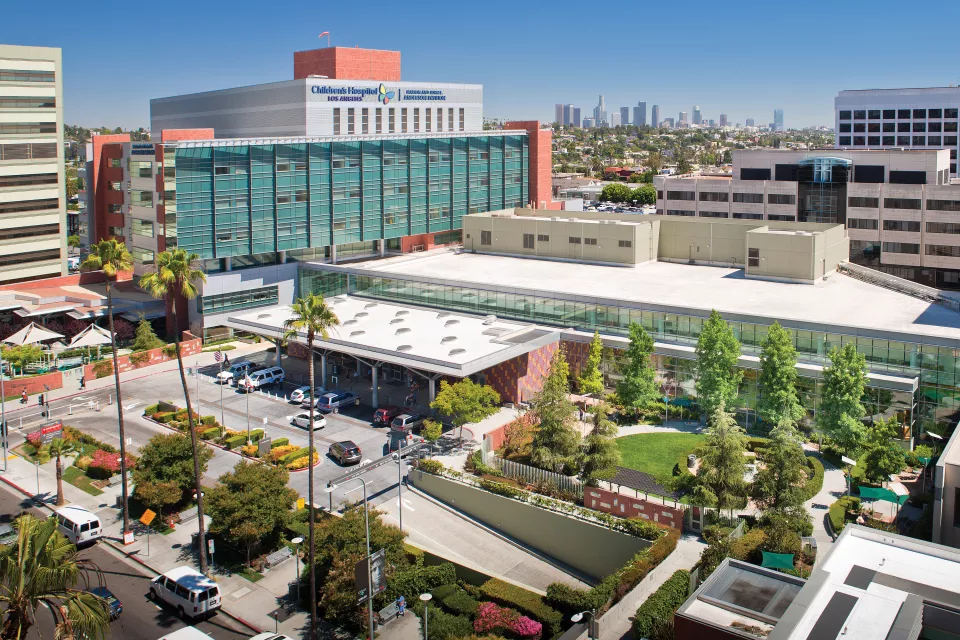About the Fellowship
Children’s Hospital Los Angeles Neurodevelopmental Disabilities (NDD) Fellowship provides comprehensive training for child neurologists to gain clinical proficiency in assessing, diagnosing, and treating NDDs. Fellows will learn to navigate advocacy and legislative matters related to children with complex neurologic conditions. They will also develop the skills to engage in community project development and participate in cutting-edge research to expand our knowledge and care of children with neurodevelopmental conditions.
Why CHLA?
CHLA is the largest freestanding children’s hospital in Los Angeles County. We care for a diverse patient population, treating both routine pediatric illnesses and rare conditions. As a primary safety net hospital for children in need of highly specialized pediatric medical care, CHLA ensures that no child is ever turned away.
Educational Program Information
Aims:
- To train child neurologists in neurodevelopmental disabilities who desire to become leaders in the care of children with NDDS, including intellectual disability, autism, attention deficit hyperactivity disorder, motor disorders, and rare neurogenetic conditions, at the local, regional, and national levels by providing them with the tools needed to develop skills in academics, research, education, innovation, quality improvement, and patient safety.
- To extend the training of child neurologists to become experts in community partnership and advocacy through Leadership Education in Neurodevelopmental Disabilities in conjunction with the University of Southern California’s University Center of Excellence in Developmental Disabilities (UCEDD), a national network of pediatric disability care organizations.
- To provide fellowship training within an interdisciplinary framework. Training and supervision from core Child Neurology and Neurodevelopmental Disabilities faculty and other disciplines, including developmental and behavioral pediatrics, psychology, psychiatry, physical rehabilitation, speech pathology, audiology, social work, and special education, will allow for a diverse and expansive expert model and facilitate whole-patient care.
- To extend the training of child neurologists in the comprehensive evaluation, diagnosis, pharmacologic management, and translational research of patients with a variety of neurodevelopmental disabilities, including those that are more common (intellectual disability and autism spectrum disorder, attention deficit hyperactivity disorder, motor disorders) to more rare and neurogenetic syndromes such as Tuberous Sclerosis Complex, Rett syndrome, Dup15q syndrome, that are strongly associated with NDDs.
- To train fellows in the neurobiology of a variety of neurodevelopmental disabilities and foster research opportunities to expand current knowledge, treatment and management options for patients, families, and communities living with NDDs.
- To provide well-rounded training and ensure our fellows have diverse, equitable, inclusive, and whole-person educational experiences and well-being. To cultivate experience and expertise that furthers leadership and a long-fulfilling career in caring for a diverse population of children with neurodevelopmental disabilities.
Learn More about the Training Program
The Neurological Institute and KiNDD Lab house multidisciplinary clinics and research studies focused on Rett syndrome, Angelman syndrome, Dup 15q syndrome, Neurofibromatosis, and Tuberous Sclerosis Complex. These programs provide extensive opportunities for fellows to engage in clinical and translational research, innovative fellow-driven clinical projects, medical education, and disability advocacy. A portion of the fellowship is protected for independent research activities. These opportunities enable fellows to advance the growing field of neurodevelopmental neurology and improve the lives of their patients.
Fellowship Eligibility and How to Apply
Requirements for Application:
- Completed residency training in Child Neurology, Neurodevelopmental Disabilities, or Neurology Residency
- ACGME-, AOA-, ACGME-I Advanced Specialty, RCPSC-, or CFPC- accredited programs preferred
- Must possess a current, valid, and unrestricted license to practice medicine in the United States
- Must be board certified or board eligible for certification by the American Board of Psychiatry and Neurology or possess comparable certification or eligibility.
We are now accepting applications for the 2026-2027 NDD Fellowship Position. We will begin interviews in August of 2025. All material must be submitted prior to an interview being scheduled.
To apply, please send the following to NDDFellowship@chla.usc.edu:
- CV
- Personal Statement
- At least 3 letters of recommendation (inclusive of a letter from your neurology residency director)
Interviews will be conducted on a rolling, first come, first served basis
Program Fast Facts
ACGME Accredited: Yes
Fellows Per Year: 1
Applicants are welcome from the following primary specialties: Child Neurology
Duration: 1 year
Postgraduate Training Required: Child neurology residency
U.S. Citizenship Required: U.S. citizens, permanent residents, and J-1 or F-1 visa applicants eligible to apply
Annual Salary:
- Post Graduate Year 6: $90,557.20 minimum
- Post Graduate Year 7: $93,828.80 minimum
- Post Graduate Year 8: $96,948.80 minimum
- Post Graduate Year 9+: Please contact gme@chla.usc.edu
- Annual Housing Stipend: $8,000
Benefits Include: Health and dental insurance, 14 days paid vacation + 6 protected sick days, division-supported yearly educational stipend, GME-provided monthly meal stipend, and 401(k) matching up to 3%. For details on additional benefits, please visit CHLA’s Graduate Medical Education page.
Life in Los Angeles
Check out some of the great attractions in Los Angeles and information on where many CHLA Fellows decide to live.
